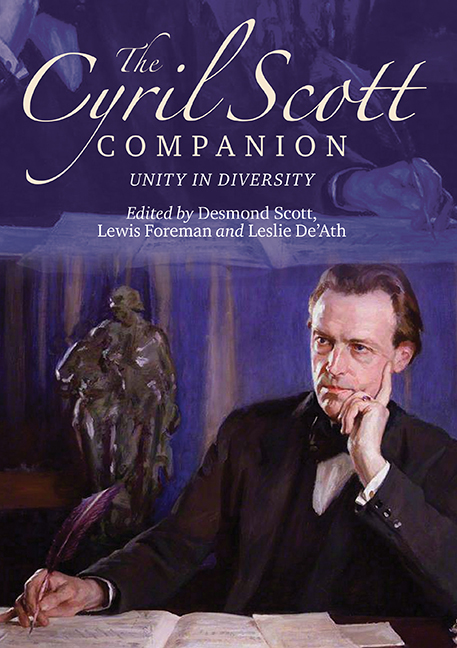Book contents
- Frontmatter
- Dedication
- Contents
- List of Illustrations
- List of Tables
- List of Contributors
- Foreword
- Preface
- Acknowledgements
- Editors' Note
- I SCOTT IN CONTEXT
- II THE MUSIC
- 8 Discovering, Editing and Recording Cyril Scott
- 9 ‘Years of Indiscretion’: The Early Piano Works, 1898–1909
- 10 ‘Like a Bird Sings’: The Piano Works from the Op. 66 Sonata to World War 1
- 11 The Later Piano Works
- 12 The Twenty-First-Century Orchestral Recordings: The Shock of the Unknown
- 13 The Chamber Music
- 14 Operas and Music for the Theatre
- 15 The Choral Works
- 16 The Songs
- III THE WRITINGS
- IV PERSONAL REMINISCENCES
- APPENDICES
- CATALOGUES, DISCOGRAPHY AND BIBLIOGRAPHY
- Index of Works
- General Index
8 - Discovering, Editing and Recording Cyril Scott
from II - THE MUSIC
Published online by Cambridge University Press: 14 September 2019
- Frontmatter
- Dedication
- Contents
- List of Illustrations
- List of Tables
- List of Contributors
- Foreword
- Preface
- Acknowledgements
- Editors' Note
- I SCOTT IN CONTEXT
- II THE MUSIC
- 8 Discovering, Editing and Recording Cyril Scott
- 9 ‘Years of Indiscretion’: The Early Piano Works, 1898–1909
- 10 ‘Like a Bird Sings’: The Piano Works from the Op. 66 Sonata to World War 1
- 11 The Later Piano Works
- 12 The Twenty-First-Century Orchestral Recordings: The Shock of the Unknown
- 13 The Chamber Music
- 14 Operas and Music for the Theatre
- 15 The Choral Works
- 16 The Songs
- III THE WRITINGS
- IV PERSONAL REMINISCENCES
- APPENDICES
- CATALOGUES, DISCOGRAPHY AND BIBLIOGRAPHY
- Index of Works
- General Index
Summary
CYRIL Scott was a composer I had known about since I was a student in the early 1980s. My composition teacher, Richard Arnell, had been a great friend of the film composer and conductor Bernard Herrmann, and it was Bernard Herrmann who had steered the great John Ogdon through the first recording of Scott's Piano Concertos for Richard Itter's Lyrita label. Herrmann, I was told by Arnell, was a lover of British music of the twentieth century: more specifically, a type of British music that was less about Edwardian splendour and more about a new and progressive practice; not overtly contemporary, still based in melody, but with a sound that was highly stylised and particular to its composer.
Arnell himself was lucky enough to have had several of his works conducted by Herrmann, including his First Symphony; Piano Concerto, Op. 44; and the world premiere of his cantata The War God, first performed to mark the original gathering of the United Nations in San Francisco. Herrmann took on the music of Arthur Bliss, too. For Herrmann to discover the music of Bliss and Arnell is fairly understandable. Bliss was an important figure in the British music establishment: he was the music director of the BBC and would later become Master of the Queen's Music. He also had an American wife, and was well represented at the New York World's Fair by his barnstorming Piano Concerto, played at its New York premiere by Solomon. Arnell, meanwhile, was an up-and-coming member of the artistic Greenwich Village set, with several important New York commissions and premiers behind him.
How Hermann came to know the music of Cyril Scott is not known to me; when he did, he found in it something that totally fitted with his quest for progressive music that was underpinned with recognisable motifs. Anyone who knows Bernard Hermann's own music will be unsurprised by this affinity, as his music is motifbased in the same way. Melodies emerge from these melodic motifs, but they are not necessarily the raison d’être of the work.
Scott was a maverick and a polymath, the type of person rather mistrusted these days because of our latent fear of anyone being that clever and knowledgeable.
- Type
- Chapter
- Information
- The Cyril Scott CompanionUnity in Diversity, pp. 115 - 126Publisher: Boydell & BrewerPrint publication year: 2018



